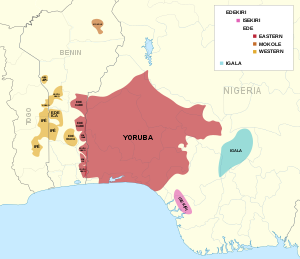| Yoruboid | |
|---|---|
| Geographic distribution | Eastern Ghana, Central Togo, Southern, Central & Northern Benin, Western, Southern and Central Nigeria |
| Linguistic classification | Niger–Congo?
|
Early form | Undifferentiated Ede-Igala
|
| Proto-language | Proto-Yoruboid language |
| Subdivisions | |
| Glottolog | yoru1244 |
 | |
Yoruboid is a language family composed of the Igala group of dialects spoken in south central Nigeria, and the Edekiri group spoken in a band across Togo, Ghana, Benin and southern Nigeria, including the Itsekiri of Warri Kingdom.[1]
YouTube Encyclopedic
-
1/4Views:31 0351 7073 742 061960 841
-
AN INTRODUCTION TO EDO LANGUAGE SPOKEN AND WRITTEN ALPHABETS: ONA EDO NA ZE KEVBE NA GBEN
-
YOUNGEST SPORTS ANALYST IN YORUBA LANGUAGE MADE HIS DEBUTE
-
Africans Give Me Free Food When I Speak Their Language
-
TOP 100 BEAUTIFUL WORSHIP SONGS 2021🙏2 HOURS NONSTOP CHRISTIAN GOSPEL 2021🙏PRAISE WORSHIP SONGS 2021
Transcription
Name
The name Yoruboid derived from its most widely spoken member, Yoruba, which has around 55 million primary and secondary speakers.[citation needed] Another well-known Yoruboid language is Itsekiri (about 1,000,000 speakers). The Yoruboid group is a branch of Defoid, which also includes the Akoko and Ayere-Ahan languages.[2]
The term Defoid itself is a derivative combination using the elements ede (meaning 'language' in most lects within the grouping), "Ife", a city of profound cultural significance to speakers of the diverse lects, and -oid, a suffix meaning 'to be like' or 'in the same manner as'. The Defoid group itself is a branch of the Benue–Congo subfamily of the wider Niger–Congo family of languages.
All Yoruboid languages are tonal, with most of them having three level tones. Grammatically, they are isolating with a subject–verb–object basic word order and share significant degrees of both structural and lexical similarities.
Languages
Igala is a key Yoruboid language, spoken by 1.6 million people in the Niger-Benue confluence of central Nigeria; it is excised from the main body of Yoruboid languages to the west by Ebira and the northern Edoid languages. Igala is closely related to both Yoruba and Itsekiri languages.
The Itsekiris are a riverine Yoruboid people who live in the Niger Delta region of Nigeria. They maintain a distinct identity separate from other Yoruboid people but speak a very closely related language. Their neighbouring languages are the Urhobo, the Okpe, the Edo, the Ijo, and the Mahin / Ugbo, Yoruba dialects spoken in neighbouring Ondo State.
Subdivisions
| Proto-Yoruboid | |||||||||||||||||||||||||||||||||||||||||||||||||||||||||||||||||||
| Igala | Edekiri | ||||||||||||||||||||||||||||||||||||||||||||||||||||||||||||||||||
| Ede (Yoruba Proper)* | Itsekiri** | ||||||||||||||||||||||||||||||||||||||||||||||||||||||||||||||||||
| Western Ede | Mokole | Eastern Ede | |||||||||||||||||||||||||||||||||||||||||||||||||||||||||||||||||
| North Nago & Ede Kura | Southwestern Ede | Ede Shabe | Southeastern Ede | ||||||||||||||||||||||||||||||||||||||||||||||||||||||||||||||||
| Ede Isha & Manigri | Ede Idaasha | Ana-Ife | Nuclear Yoruba | Ede Ije, South Nago | |||||||||||||||||||||||||||||||||||||||||||||||||||||||||||||||
| Ede Yoruba - Lucumi | Olukumi*** | ||||||||||||||||||||||||||||||||||||||||||||||||||||||||||||||||||
| NWY & SWY | Central Yoruba | NEY & SEY | |||||||||||||||||||||||||||||||||||||||||||||||||||||||||||||||||
* - All dialects in the Ede cluster share between 85 and 95% lexical similarity and are thus all mutually intelligible without needing different specialized literature to achieve universal understanding.
** - Itsekiri is actually most closely related to SEY (South-Eastern Yoruba), and is a divergent branch thereof, but has a different standard writing orthography.
*** - Some scholars classify Olukumi as separate variant of Nuclear Yoruba, and others as a dialect of SEY.
Names and locations
Below is a list of selected Yoruboid language names, populations, and locations from Blench (2019).[3]
| Language | Dialects | Alternate spellings | Own name for language | Endonym(s) | Other names (location-based) | Other names for language | Exonym(s) | Speakers | Location(s) |
|---|---|---|---|---|---|---|---|---|---|
| Ulukwumi | Olukumi, Unukwumi | 20,000 | Delta State, Aniocha and Oshimili LGAs | ||||||
| Igala | Ánkpa and Ògùgù in Ankpa LGA; Ìfè in Ankpa and Dekina LGAs; Ànyìgbá in Dekina LGA; ‘Idáh and Ìbàjì in Idah and Anambra(?) LGAs; and Èbú in Oshimili LGA | Igara | 295,000 (1952), 800,000 (1987 UBS) | Benue State, Ankpa, Dekina, Idah and Bassa LGAs; Edo State, Oshimili LGA; Anambra State, Anambra LGA | |||||
| Iṣẹkiri | Itsekiri, Ishekiri, Shekiri, Chekiri, Jekri, Izekíri, Tshekeri, Dsekiri | Iwere, Irhobo, Warri | Iselema–Otu (Ịjọ name for Warri/Itsekiri people), Selemo | 33,000 (1952); over 100,000 (1963 Omamor); 500,000 (1987 UBS) | Delta State, Warri, Bomadi and Ethiope LGAs | ||||
| Yoruba | Many dialects | Yorùbá | Yorùbá | Aku, Akusa, Eyagi, Nago | 5,100,000 (1952), 15,000,000 (UBS 1984), 50,000,000 (Ethnologue 2018)[4] | Most of Kwara, Lagos, Osun, Oyo, Ogun, Ekiti and Ondo States; western LGAs in Kogi State; and into Benin Republic, Togo and Ghana. Yoruba is spoken as a ritual language in Cuba and Brazil |
See also
References
- ^ "Benue-Congo languages | African Language Family | Britannica". www.britannica.com. Retrieved 2024-02-25.
- ^ "Defoid languages, Ethnologue". 2 October 2021.
- ^ Blench, Roger (2019). An Atlas of Nigerian Languages (4th ed.). Cambridge: Kay Williamson Educational Foundation.
- ^ Yoruba at Ethnologue (25th ed., 2022)

![]() This article incorporates text available under the CC BY 3.0 license.
This article incorporates text available under the CC BY 3.0 license.
External links
- Proto-Yoruba-Igala Swadesh list (N. Aubry, H. Friedman & K. Pozdniakov 2004)
